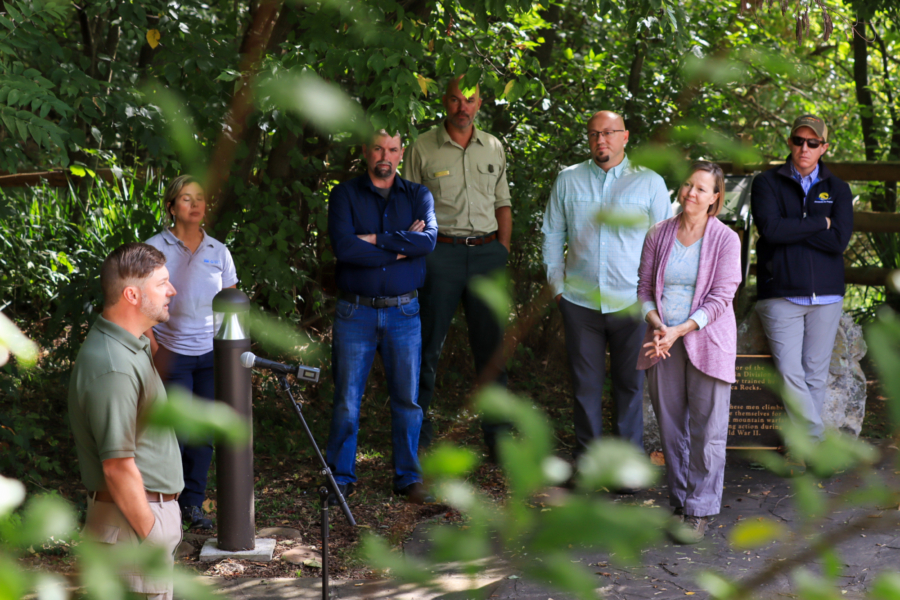Far from the shores of the Chesapeake, organizations are recognized for their efforts to keep the Bay healthy
EPA, NFWF award 56 grants totaling over $23.8 million

In early September, the stunning natural phenomenon of Seneca Rocks served as the backdrop to announce the most recent round of Small Watershed Grant (SWG) recipients. The decision to make this announcement in this location, three hours from the Chesapeake Bay, near the headwaters of the Potomac River in West Virginia, was not chosen at random.
Dustin Wichterman, associate director at Trout Unlimited, couldn’t contain his smile as he told the assembled crowd about all the work his organization has been doing in West Virginia thanks to grants such as the SWG program.
“In fact, Trout Unlimited’s Potomac Headwaters Home Rivers Initiative, a flagship conservation effort for Trout Unlimited, was spawned here in the headwaters with a small grant just like the one we’re talking about today,” noted Wichterman.
The SWG program supports projects throughout the Chesapeake Bay watershed that promote voluntary, community-based efforts to protect and restore the diverse and vital habitats of the Chesapeake Bay and its tributaries. Grants totaling $23.8 million were awarded across each of the seven jurisdictions of the Chesapeake Bay watershed. Some highlights include:
Delaware: Received over $1.7 million to support organizations like the Nanticoke Watershed Alliance, who will receive $451,300 to stabilize a severely eroding shoreline along Broad Creek in Laurel, Delaware. The project will restore 600 feet of shoreline, helping to reduce annual sediment pollution by more than 60 tons.
District of Columbia: Over $1.4 million will go toward projects, including work to be completed by the Anacostia Watershed Society, who will develop a plan to mitigate stormwater runoff in Congressional Cemetery.
Maryland: Received over $9.4 million to support projects, including the one proposed by Prince George’s County Government to restore more than 1,000 linear feet of a degraded tributary of Lower Beaverdam Creek. This project will utilize $999,700 to mitigate streambank erosion, stabilize the stream channel and remove invasive vegetation, thereby reducing nutrient and sediment pollution and improving water quality.
New York: Trout Unlimited will also receive $999,400 out of New York’s total award of over $3.6 million. This project will improve and reconnect 4.3 miles of brook trout habitat along Butternut Creek, a tributary of the Susquehanna River, by removing Morris Pond Dam, restoring a quarter mile of the stream channel, adjacent floodplain and riparian corridor, and transferring six acres of private land to General Jacob Morris State Forest.
Pennsylvania: Over $7.5 million will go to organizations like the Alliance for the Chesapeake Bay, who plans to use $150,000 to engage volunteers in growing native trees to expand the seedling capacity necessary to support riparian restoration and reforestation projects. The project will engage 250 community members, plant 6,000 native tree seedlings and create educational curricula to further similar efforts.
Virginia: Virginia Tech will receive $150,000 out of Virginia’s total award of over $7.3 million to assist the Nansemond Indian Nation in planning and enhancing natural and nature-based community resilience. The project will work with the Nansemond Indian Nation, a federally recognized Virginia Tribe, in adapting the Resilience Adaptation Feasibility Tool Scorecard and process for their community by developing a community plan that best meets their strengths, weaknesses and current capabilities for enhanced resilience.
West Virginia: Over $2.3 million was awarded to projects in West Virginia, including Trout Unlimited, but also to the Chesapeake Stormwater Network, who will use $330,000 to deliver core stormwater training programs across the entire Bay watershed.
“From blue crabs to brook trout, we are focusing on restoring and conserving our living resources that are both important to the local economy and our region’s natural heritage,” said Shimkin. “The work to protect and restore our waterways is a true community effort and through these conservation projects, we can continue to build on our current momentum.”
The complete list of all projects funded by the SWG program can be found here.

Comments
There are no comments.
Thank you!
Your comment has been received. Before it can be published, the comment will be reviewed by our team to ensure it adheres with our rules of engagement.
Back to recent stories